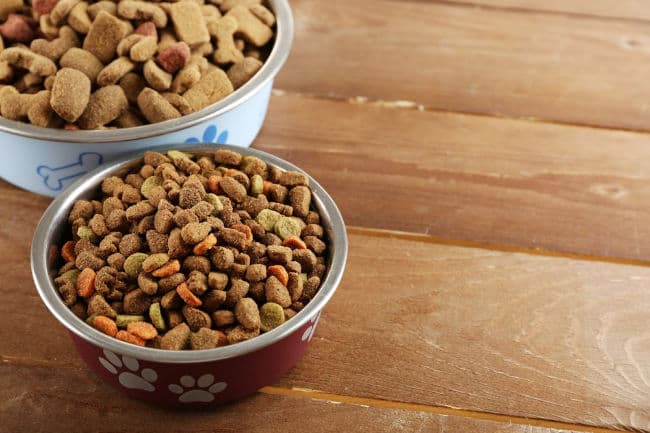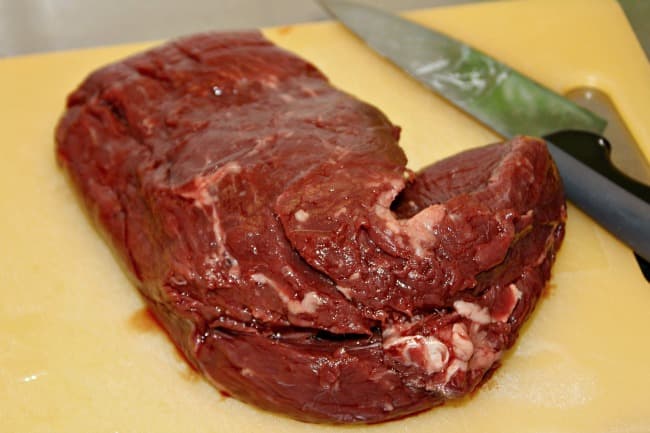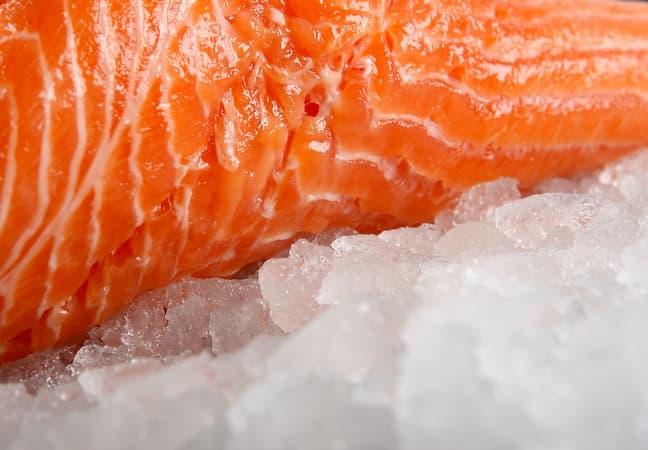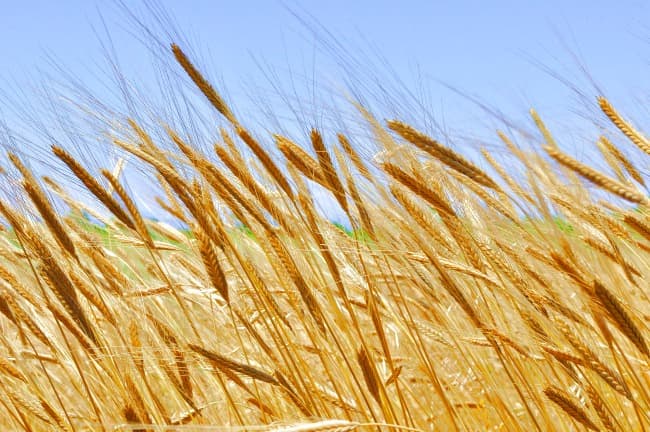FYI: If you buy something through a link on this site I may earn a commission - at NO extra cost to you.
What To Feed An Old Dog
Deciding what to feed an old dog isn't necessarily complicated, but an optimum diet is an important part of keeping your senior dog healthy and minimizing certain health conditions.
Fido may have been eating the same dog food his whole adult life, and it's possible that it's no longer the best choice for him. Of course, this isn't always the case, and a premium, well balanced food (especially if it's an 'All Life Stages' formula) may be the right fit for your generally healthy senior dog.
There are dog food formulas that are labeled specifically for senior or geriatric dogs, but as there are no AAFCO guidelines for this type of formula they can vary significantly and are definitely not a one-size-fits-all product.
Older dogs have some specific dietary needs and it's important to know what those are so that you can make sure the food your feeding your senior dog is right for him, regardless of how it's labeled.

It's not unusual for senior dogs to lose their appetites over time and this can either be as a normal result of the aging process, or due to physical, emotional or cognitive issues. If you're having trouble feeding an old dog who won't eat check out this page for lots of tips and advice.
What Food Do Senior Dogs Need
As your dog ages, his body changes and so do his nutritional needs, but not every dog will age in the same way, or at the same rate. What your old dog needs depends on his age, breed, size, general health, activity level and so on.
But there are some generalities which apply to most senior dogs in terms of what they need from their food. These include:
- Above average amount of meat-based protein (25%+)
- Moderate amount of calories (@350-370 kcal per cup)
- Moderate fat content (10-15%)
- Moderate fiber (3-5%)
- Low to moderate complex carbs (20-40%)
- Added supplements
Protein for senior dogs
Dogs need more protein in their diet as the age. In fact a study which compared the dietary needs of 2 year old Beagles to 13 year old Beagles found that the senior dogs needed up to 50% more protein than the younger ones.
Protein is needed to help maintain, and even build, muscle mass (which tends to decrease with age). It also helps to support your dog's immune and nervous systems, aid in tissue repair and improve energy and metabolism.
It's important for old dogs to get high quality protein, and this comes from whole meat (avoid meat meal or bone meal or other inferior meat protein sources).

You may have heard that high protein diets can contribute to kidney problems but this is not supported by any research and is clearly not valid. However, if your senior dog has an existing kidney problem, your veterinarian MAY want to keep dietary protein levels in the low/moderate range. However it depends on many individual factors and only a veterinarian is qualified to make that recommendation.
calories in senior dog food
It's pretty common to think that older dogs need lower calorie foods, but this is only the case if you have a dog who is overweight, or obese. If this is the case for your dog, then a lower-calorie dog food, combined with increased (but age-and-condition-appropriate) exercise can help keep weight down and lessen the chances of corresponding health conditions.
However, for senior dogs who aren't overweight, a moderate calorie formula is the best option.
If your old dog is underweight, or has decreased appetite or is difficult to feed there are things you can do to encourage him to eat. Increasing the fat content of his diet can also increase his calorie intake.
dietary fats for old dogs
A healthy senior dog who isn't overweight doesn't generally need a low fat diet. Fat plays an important part in helping your dog's body to function optimally. It's a fuel which is burned to create energy, helps maintain body heat and help with nutrient absorption.
Not all fats are created equal so stick to healthy fats such as fish oil (salmon oil is a good choice) which contain Omega 3 fatty acids. Coconut oil is another great option.

If your dog is carrying too many pounds then both fat and calories should be moderated to prevent obesity-related health conditions, but don't drop them too low as these are both crucial dietary components.
If your old dog has heart problems or pancreatic problems you may need to keep the fat content of your senior dog's diet lower, your veterinarian can advise you on this.
fiber content of food for older dogs
As with most bodily systems, your dog's digestive system can slow down with age and become sluggish. Reduced appetite and less exercise can also contribute to occasional, or even chronic, constipation issues in senior dogs. Extra dietary fiber can help with this.
However, fiber can also make it more difficult for your dog to efficiently absorb the nutrients in his food so higher fiber formulas aren't a good choice for dogs who don't have constipation issues.
The best fibers include beet pulp, canned pumpkin, and wheat bran. You may find commercial formulas which use beet pulp and/or wheat bran, or you can add the bran or canned pumpkin (not pie filling) to your dog's bowl as, and when. needed.
complex carbohydrates in dog food
Carbs aren't all created equal. Complex carbohydrates are more nutrient dense, are higher in fiber, and have a lower glycemic index than simple carbs (which helps keep blood sugar levels stable).

The function of carbohydrates is to provide energy for the body, but strictly speaking dogs don't NEED carbs. They can do just fine getting their energy from protein and fat sources. However carbs also contain certain nutrients such as vitamins , minerals and probiotics, so when the right ones are given in moderation they can be beneficial.
Good sources of complex carbs include whole grains ( choose brown rice, oats, wheat, quinoa or barley, avoid corn and regular wheat), organ meat, vegetables, some fruits, beans and legumes.
dietary supplements for old dogs
Most senior dogs can benefit from having certain supplements in their diet. The most popular ones are:
- Glucosamine
- Chondroition
- Omega-3 and Omega-6 fatty acids
- Digestive enzymes/prebiotics/probiotics
Dogs don't need extra calcium and it's also advisable to keep sodium intake lower.
Some commercial dog food formulas contain one, several, or all of the above supplements, but the heat used in commercial processing can destroy some, even the majority, of the benefits.
Giving your older dog additional supplements (especially if he has bone/joint conditions or digestive issues) can be a good option.
Here are some examples....
Always discuss any kind of supplementation with your veterinarian first, as he/she has professional knowledge of your dog's health and can advise you on what is best for Fido.
you might also like...
- Home
- What To Feed An Old Dog
FTC Disclosure: Some pages on this site contain affiliate links. I may earn on qualified purchases.





